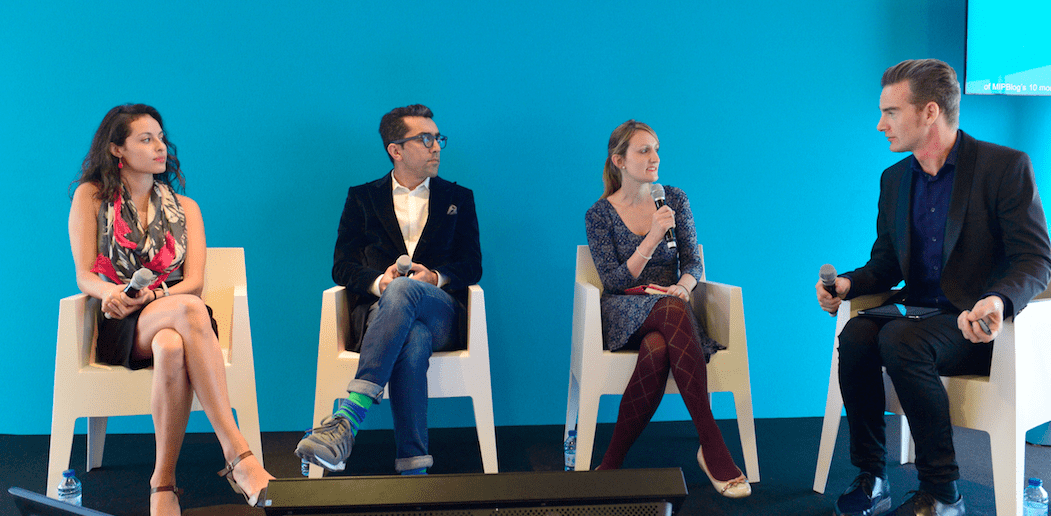Left to right: Jocelyn Johnson, founder and principal, VideoInk; Ali May, presenter, Mayheart; Sandra Lehner, commercial director, The Project Factory; and moderator James Martin, social media manager, MIP Markets.
What were MIPCOM & MIPJunior’s hottest industry trends, as spotted on social media? today’s Trending Topics saw three experts delve in and analyse them.
Before kicking off, Martin asked everyone for their big standout moments of the week. Lehner began: “I was impressed by Simon Cowell — how honest, likeable and approachable he was.”
May, on the other hand, focused on the week as a whole. “I was a MIP virgin until I came here. I have learned so much,” he said. “It’s hard for me to pick just one thing, because the whole experience has been incredible. Meeting some of you guys — you’re great at what you do. I’ve drunk the Kool-Aid.”
“The week opened up strong with Starz announcing they’d be expanding internationally with OTT,” said Johnson, for whom OTT was a big over-arching topic.
Moving on to the big trends (presented in no particular order!):
MEXICO. Hashtags: #mexicoMIPCOM #televisión
“It’s great to see this strong movement of Mexican TV happening here,” Martin said, pointing to Mexico’s position as MIPCOM’s Country of Honour. “If all these retweets mean people are seeing Mexico’s work at MIPCOM, it’s creating buzz all over the world,” he added.
May singled out one Twitter user inparticular: Mauricio Alatorre, a MIPCOM-goer whose tweets from MIPCOM with the face of a famous Mexican actor — Mr Alberdu — photoshopped on top were massively retweeted… by the actor in question! Here’s just one example:
Con @brandon_meza @malatorre y @bilofranco esperando la premiere de The Book Of Negroes. #MIPCOM #mexicoMipcom @mip pic.twitter.com/stt9CoY5Cv
— Mr. Alberdu (@alberdu) October 13, 2014
“I’m a big telenovela fan,” said Lehner. “I went to Fresh TV to see their Mexican TV picks, and learned a new term: narco telenovelas! It’s all about drugs, thugs and divas—” often stories about women taking over their man’s drug business, dealing with a death or with a deal gone wrong.
KID’S TV. Hashtags: #MIPJunior
As always, we kicked this week off with MIPJunior. “It wasn’t surprising that it came out as a top trending topic, but what did surprise us was that, of the stop-ten most retweeted MIPBlog conference reports, four were about MIPJunior,” said Martin, who also pointed out that MIPJunior attendees total a mere 1300 people to MIPCOM’s 13,700.
Our liveblog on the international pitch for cross-platform kids’ projects did very well, as did news about the Thunderbirds remake. “There is life in rejuvenating old favourites,” remarked Martin.
“I know a lot of grownups that are really excited to have the Thunderbirds back!” said Lehner.
May lamented that maybe we’re milking the cow to death when rehashing old IPs again and again. Johnson replied, “If Maker Studios can help make R2D2 relevant for my future children, then that’s a huge value.”
She went on, “There’s definitely a surge of interest for kid’s programming that ties the family together as a whole. A lot of broadcasters, digital and brands in general are looking to lock down this younger generation; kids are becoming more active on mobile and streaming platforms. I just think we’re seeing a surge in appetite for new formats that reach kids there.”
“In the past few years we’ve seen lots of fantastic stuff for adults with the rise of Netflix,” May said. “Maybe now there’s a gap for high-quality programming for kids, and maybe that’s why we see that large appetite.”
“If you look at some of the digital platforms investing in content, Amazon and Netflix made kid’s programming their second choice right after those big dramas,” said Johnson.
GOLDEN AGE OF TV. Hashtags: #showrunners #stars #vod
“Showrunners, stars and VOD platforms all seem to agree that TV is the new black,” said Martin. “M. Night Shyamalan said TV is the place to make content that resonates, whereas the cinema is just becoming more about money.”
Johnson agreed that today, great content that feels cinematic is becoming a big event in itself, creating niche communities and commentary shows that build on them.
“You have new genres of high-quality stuff on TV. Quality for me is the top thing,” said May. “I think technology’s moving it forward, and new platforms. When you have competition, you have to innovate. If you are Netflix or a VOD platform, you need something that will steal people from normal TV slots.”
The biggest show-related hashtags this week were #kingdom & #schittscreek.
Kingdom’s popularity can at least in part be attributed to lead actor Nick Jonas’ presence as a promotional vehicle. His Twitter following is massive; he received 1,460 retweets from 2 tweets about being here, said Martin.
Johnson was impressed by Jonas’s commitment to fans and the show. “You’re actively engaging this conversation,” she said, adding that it’s important to have an active social strategy that facilitates interaction with fans around programming.
“It’s a huge bonus for a show if your star is active on social media,” said Martin.
The jury remains out whether #schittscreek was discussed online for its merits or because it was just funny to say.
The panelists also discussed #scripted programming. Is there a saturation point, Martin wondered?
“There are so many genres now, and having variety is great,” said Lehner. “Everyone has their own taste; it adds value to have so many great series out there.”
“When there are so many different formats from so many different broadcasters on a global scale,” it’s difficult to be seen, said Johnson. But online platforms “give way for discovery or a longer tail.”
“It makes it difficult for those who want to create these shows,” May used. “When you’ve got all thse shows, all great quality, you wonder, what next? What next can we make?”
DIGITAL. Hashtags: #Netflix #TVxTwitter #2screen #digitaldistribution
The keynote of Netflix’s Ted Sarandos was the most-attended this week, said Martin, with over 1000 people watching at Palais. The resulting conference report was also the most-shared. He asked panelists what they thought of their earnings report, which came out last night and reflected a decline.
“Even though Netflix’s earnings were down, the likely cause is that it’s the first quarter they didn’t have a big original they were pushing heavily,” said Johnson. “Those are huge drivers of subscription acquisition.”
“Broadcasters are really scared of the new platforms, the new innovations,” May added, citing a joke where a broadcaster he recently met exclaimed Netflix is “trying to kill us!”
“Look at Netflix’s syndication,” Johnson challenged. “How many top-performing movies are still there? There’s almost none left. Broadcasters are yanking all their syndication off” so they can launch their own proprietary OTTs internationally.
“I think they’re all gonna start doing that and trying to figure out the right pricepoint. They’re gonna end up ultimately cannibalising the cable business by moving into OTT this way and reinforcing this à la carte mentality. It’ll create more segmentation in the market,” she added.
On to Twitter: this week, Twitter’s Fred Graver claimed “doubles the emotional connection to TV,” Martin said. How did they measure that?
“He was saying if the actors contribute to Twitter, 90% of people take action afterwards,” said Lehner. “I think you get an emotional connection to the show when the actors are involved.”
“That chart was the only weak point of the Twitter’s session,” May chimed in. “I get what they’re talking about in some ways — when you tweet to The Voice UK, you feel like you’re making a difference even though you may not be,” he added.
Johnson called the social activity around television a digital water cooler. “This goes back to user behaviour. People want to be social, connecting off and online. I feel like that’s their voice — feeling a sense of community around programming, around the world.”
May also observed that Twitter’s big success was in ingratiating itself into drama, because people don’t really tweet all through a drama programme. He pointed to the House of Cards twitter account, which he called “golden,” coupled with “all the stars coming and livetweeting.”
There appears to be enormous pressure on stars now to lift the popularity of your show by participating in the viewing experience online, he added. “I met someone from an upcoming Netflix show and she was worried because she’s the only one who’s media savvy. She was like, ‘What do we do? Scandal’s doing this! House of Cards is doing this!'”
Johnson observed, “Amazon had it built into their contract that actors cannot socialise on Twitter because they don’t want social amplification to impact organic interest,” which Amazon tracks closely.
FRESH TV? Hashtags: #cloneddogs #manvsfly and #celebritypoledancing
Finally, the panelists discussed hashtags relating to the most-discussed programmes showcased by The WIT’s Virginia Mouseler, at Monday’s Fresh TV session.
In reference to the Keep Your Dog Alive format (the source of the #cloneddogs hashtag, in which the prize is a clone of the winner’s dog), Lehner said, “I was reading that a dying man reunited with his dog and felt immediately better. I guess they’re not only pets; they’re our friends!”
The concept definitely appealed to one person: as Martin pointed out, Syco’s Simon Cowell told The Guardian here at MIPCOM that he had considered cloning his dogs!
Man vs. Fly, an online video project made for UK newspaper The Sun, where a man does battle with a fly he must swat, is equally mind-boggling, the panelists observed. How crazy can factual/game formats like this get, asked Martin?
“If you’re always looking for something, if you don’t have any good ideas, you’ll maybe convince a commissioner who doesn’t have anything to commission to take it,” said May.
“Or you could just just put it online,” Johnson quipped.
Martin also asked about an anti-trend, #socialTV — why wasn’t it a hashtag?
“I think everything is inherently social now,” said Johnson. “There is no longer a need to tack social onto everything.”
Last year’s buzzwords, this year’s standard fare? Find out at our next Trending Topics panel!
Watch clips from this session, this morning’s Facebook workshop, and all of our keynotes here!




